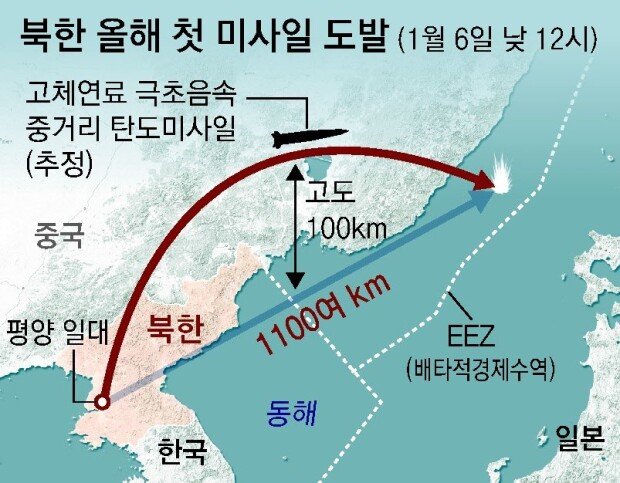N. Korea fires intermediate-range ballistic missile
N. Korea fires intermediate-range ballistic missile
Posted January. 07, 2025 07:57,
Updated January. 07, 2025 07:57

North Korea launched an intermediate-range ballistic missile (IRBM) into the East Sea on Monday. This marks its first missile provocation of the year and the first in two months since the launch of a super-large multiple rocket launcher (KN-25) in November of last year. The timing of this provocation coincides with the first U.S.-South Korea foreign ministers’ meeting since South Korea's presidential impeachment crisis, suggesting that North Korea may be asserting its presence ahead of the launch of the second Trump administration. Both South Korea and the U.S. have detected signs of potential additional provocations involving intercontinental ballistic missiles (ICBMs) and are closely monitoring related developments.
According to military sources, the IRBM was launched around noon on Monday from the vicinity of Pyongyang. The missile, launched from a transporter erector launcher (TEL), flew approximately 1,100 kilometers before landing in the East Sea after passing over Alsom Island off the coast of Kilju County, North Hamgyong Province. Its peak altitude was estimated to be around 100 kilometers.
The military suspects it could be a newly developed hypersonic IRBM, Hwasong-16Na, that was launched in April last year under the observation of North Korean leader Kim Jong Un. “There is also a possibility that an improved version of the Hwasong-16Na was launched with Kim present on the site,” a military official added. South Korean and U.S. authorities reportedly observed the movement of larger TELs in the Pyongyang area, raising concerns. A military source stated they were preparing for the possibility of additional ICBM provocations.
U.S. Secretary of State Tony Blinken stated during a joint press conference following the U.S.-South Korea foreign ministers’ meeting that there is credible information that Moscow intends to share advanced space and satellite technology with North Korea. This statement officially confirmed the belief that Russia may provide advanced technology to North Korea in exchange for large-scale troop deployments and weapons support. “Russian President Vladimir Putin is edging closer to reversing decades of policy and possibly tolerating North Korea's nuclear weapons,” Blinken added.
Sang-Ho Yun ysh1005@donga.com







